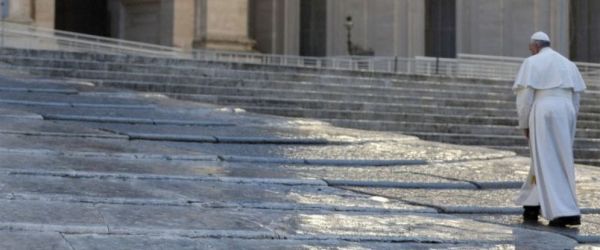Today’s Gospel passage (cf. Mt 23:1-12) is set in the final days of Jesus’ life, in Jerusalem; days filled with expectations and also tension. On the one hand, Jesus directs harsh criticism at the scribes and Pharisees, and on the other, he entrusts important mandates to Christians of all times, thus also to us.
He says to the crowd: “The scribes and the Pharisees sit on Moses’ seat; so practice and observe whatever they tell you”. Meaning that they have the authority to teach what is in conformity with the Law of God. However, immediately after, Jesus adds: “but do not do ‘what they do; for they preach, but do not practice’” (vv. 2-3). Brothers and sisters, a frequent flaw of those in authority, whether civil or ecclesiastic authority, is that of demanding of others things — even righteous things — that they do not, however, put into practise in the first person. They live a double life. Jesus says: “They bind heavy burdens, hard to bear, and lay them on men’s shoulders; but they themselves will not move them with their finger (v. 4). This attitude sets a bad example of authority, which should instead derive its primary strength precisely from setting a good example. Authority arises from a good example, so as to help others to practise what is right and proper, sustaining them in the trials that they meet on the right path. Authority is a help, but if it is wrongly exercised, it becomes oppressive; it does not allow people to grow, and creates a climate of distrust and hostility, and also leads to corruption.
Jesus openly denounces some of the negative conduct of the scribes and of some Pharisees: “they love the place of honor at feasts and the best seats in the synagogues, and salutations in the market places” (vv. 6-7). This is a temptation that corresponds to human pride and that is not always easy to overcome. It is the attitude of living only for appearances.
Then Jesus entrusts the mandates to his disciples: “you are not to be called rabbi, for you have one teacher, and you are all brethren. [...] Neither be called masters, for you have one master, the Christ. He who is greatest among you shall be your servant” (vv. 8-11).
We disciples of Jesus must not seek titles of honour, of authority or supremacy. I tell you, it pains me personally to see people who, psychologically, live in pursuit of vain accolades. We disciples of Jesus must not do this, because among ourselves there must be a simple and fraternal attitude. We are all brothers and sisters and in no way must we abuse others or look down on them. No. We are all brothers and sisters. If we have received talents from the heavenly Father, we must place them at the service of our brothers and sisters, and not exploit them for our own satisfaction and personal interests. We must not consider ourselves superior to others; modesty is essential for an existence that seeks to conform to the teaching of Jesus, who is meek and humble of heart and came not to be served but to serve.
May the Virgin Mary, “humble and exalted more than any creature” (Dante, Paradiso, xxxiii:2), help us, with her motherly intercession, to spurn pride and vanity, and to be meek and docile to the love that comes from God, for the service of our brothers and sisters and for their joy, which will also be our own.
[Pope Francis, Angelus, 5 November 2017]












